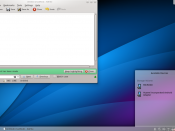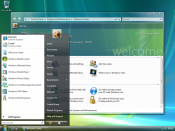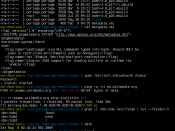1.The four major functions of an operating system are:
Managing programs
Managing Memory
Handling input and output
User Interface
Managing programs
Managing programs is one of the functions that are most dramatic effect to the operating systems overall quality. There are many different systems that are used for managing programs. You have single tasking, in which you can run only one program application at a time. Multi-tasking in which in the normal operating system allows a single user to work with more than one program at a time.
Managing memory
The second function of an operating system is managing memory. The operating system gives each individual program a certain amount of memory this is called a partition. If the memory becomes full then the operating system starts storing copies of the pages into files in the hard disk. This is called a swap file.
Input and Output
Input and output devices generate interrupts, and sends signals that inform the operating system that something has occurred.
Some examples of input and output devices are monitors, modems, and sound cards.
User Interface
The quality of the user interface is what makes or breaks the system. This is the part of the operating system that interacts with the user. Sometimes it is also referred to as the shell. This is implying that the user interface is surrounding the operating system, which is referred to as the kernel. There are three different types of user interface. These are command-line, menu-driven, and graphical interface.
2.
a) How did Linus get the attention of so many people willing to volunteer their time to create Linux?
Linus commented that in order to get people to help you, you need to have a program that is interesting, not boring. People want a challenge and if it will...


